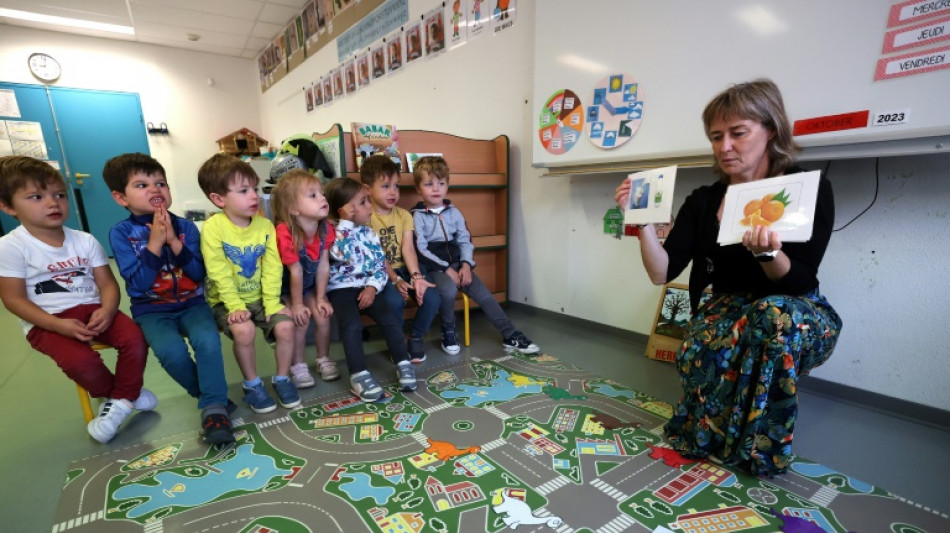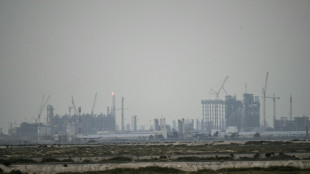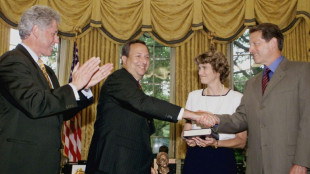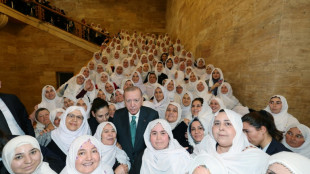
-
 Underdogs Wales could hurt Irish after Scotland display: Popham
Underdogs Wales could hurt Irish after Scotland display: Popham
-
Gilgeous-Alexander rules over Knicks again in Thunder win

-
 Hamilton reveals sequel in the works to blockbuster 'F1: The Movie'
Hamilton reveals sequel in the works to blockbuster 'F1: The Movie'
-
Alonso, Stroll fear 'permanent nerve damage' from vibrating Aston Martin

-
 China boosts military spending with eyes on US, Taiwan
China boosts military spending with eyes on US, Taiwan
-
Seoul leads rebound across Asian stocks, oil extends gains

-
 Tourism on hold as Middle East war casts uncertainty
Tourism on hold as Middle East war casts uncertainty
-
Bayern and Kane gambling with house money as Gladbach come to town

-
 Turkey invests in foreign legion to deliver LA Olympics gold
Turkey invests in foreign legion to deliver LA Olympics gold
-
Galthie's France blessed with unprecedented talent: Saint-Andre

-
 Voice coach to the stars says Aussie actors nail tricky accents
Voice coach to the stars says Aussie actors nail tricky accents
-
Rahm rejection of DP World Tour deal 'a shame' - McIlroy

-
 Israel keeps up Lebanon strikes as ground forces advance
Israel keeps up Lebanon strikes as ground forces advance
-
China prioritises energy and diplomacy over Iran support

-
 Canada PM Carney says can't rule out military participation in Iran war
Canada PM Carney says can't rule out military participation in Iran war
-
Verstappen says new Red Bull car gave him 'goosebumps'

-
 Swiss to vote on creating giant 'climate fund'
Swiss to vote on creating giant 'climate fund'
-
Google to open German centre for 'AI development'

-
 Winter Paralympics to start with icy blast as Ukraine lead ceremony boycott
Winter Paralympics to start with icy blast as Ukraine lead ceremony boycott
-
Sci-fi without AI: Oscar nominated 'Arco' director prefers human touch

-
 Ex-guerrillas battle low support in Colombia election
Ex-guerrillas battle low support in Colombia election
-
'She's coming back': Djokovic predicts Serena return

-
 Hamilton vows 'no holding back' in his 20th Formula One season
Hamilton vows 'no holding back' in his 20th Formula One season
-
Two-thirds of Cuba, including Havana, hit by blackout

-
 US sinks Iranian warship off Sri Lanka as war spreads
US sinks Iranian warship off Sri Lanka as war spreads
-
After oil, US moves to secure access to Venezuelan minerals

-
 Arteta hits back at Brighton criticism after Arsenal boost title bid
Arteta hits back at Brighton criticism after Arsenal boost title bid
-
Carrick says 'defeat hurts' after first loss as Man Utd boss

-
 Ecuador expels Cuba envoy, rest of mission
Ecuador expels Cuba envoy, rest of mission
-
Arsenal stretch lead at top of Premier League as Man City falter

-
 Title race not over vows Guardiola after Man City held by Forest
Title race not over vows Guardiola after Man City held by Forest
-
Rosenior hails 'world class' Joao Pedro after hat-trick crushes Villa

-
 Brazil ratifies EU-Mercosur trade deal
Brazil ratifies EU-Mercosur trade deal
-
Real Sociedad edge rivals Athletic to reach Copa del Rey final

-
 Chelsea boost top four push as Joao Pedro treble routs Villa
Chelsea boost top four push as Joao Pedro treble routs Villa
-
Leverkusen sink Hamburg to keep in touch with top four

-
 Love match: WTA No. 1 Sabalenka announces engagement
Love match: WTA No. 1 Sabalenka announces engagement
-
Man City falter as Premier League leaders Arsenal go seven points clear

-
 Man City title bid rocked by Forest draw
Man City title bid rocked by Forest draw
-
Defending champ Draper ready to ramp up return at Indian Wells

-
 Arsenal extend lead in title race after Saka sinks Brighton
Arsenal extend lead in title race after Saka sinks Brighton
-
US, European stocks rise as oil prices steady; Asian indexes tumble

-
 Trump rates Iran war as '15 out of 10'
Trump rates Iran war as '15 out of 10'
-
Nepal votes in key post-uprising polls

-
 US Fed warns 'economic uncertainty' weighing on consumers
US Fed warns 'economic uncertainty' weighing on consumers
-
Florida family sues Google after AI chatbot allegedly coached suicide

-
 Alcaraz unbeaten run under threat from Sinner, Djokovic at Indian Wells
Alcaraz unbeaten run under threat from Sinner, Djokovic at Indian Wells
-
Iran's supreme leader gone, but opposition still at war with itself

-
 Mideast war rekindles European fears over soaring gas prices
Mideast war rekindles European fears over soaring gas prices
-
'Miracle to walk' says golfer after lift shaft fall


Long-banned Alsatian finally allowed in French schools
In a school in eastern France, teacher Sandra Cronimus greets her pupils every morning with a lusty "Guede morje!"
She is speaking Alsatian, the German dialect spoken widely in Alsace, a wealthy border region that France and Germany have fought over three times since 1870.
Long forbidden, the language that legendary Arsenal manager Arsene Wenger grew up speaking, is now being taught for the first time in French state schools.
"Clap your hands if you like going to school," Cronimus urged her class of three and four year olds, who responded to the roll with "Ich bin do" -- "I'm here" in Alsatian.
The 15 children at the Rainbow nursery school in Brumath, north of Strasbourg, are taught three-quarters of the time in either Alsatian or German, with the rest in French.
Three other schools near the city on the Rhine have also started teaching in Alsatian, a rarity in a country where regional languages have been pushed to the verge of extinction by a centralising state, ever-vigilant of threats to French national identity.
- 'They forbade us from speaking' -
Brumath's mayor Etienne Wolf is delighted by the change.
"When I was a child they forbade us from speaking Alsatian," said the 68-year-old.
"I want to defend Alsatian, which is falling away" particularly among young people, he added. "Often people understand it but don't speak it anymore."
Classroom assistant Corinne Husser is equally overjoyed to be able to speak her first language with the children. "It's great, it's the first time I have been able to work in Alsatian," she said.
While Alsatian is spoken by around half a million people, the dialect in Brumath is not exactly the same as the one spoken by Cronimus, who comes from a village in the northern Vosges.
And it is different again to what is spoken 150 kilometres (93 miles) to the south at the other end of the region. "In Altkirch it's completely different," said the teacher, who switches easily between German, Alsatian and French with the children.
Cronimus got extra training from language experts to take on "this new challenge".
Alsatian is already taught with German in a dozen community schools across Alsace run by the private ABCM network. Several take an immersive approach, with no French at all spoken in class.
- Rapid decline -
Pierre Klein, the president of the Alsace Bilingual Federation, said it was a pity that the state schools did not follow their lead as "they could have fully benefitted from the advantages of immersion".
Even so he welcomed the belated official "recognition of the value of being bilingual given the rapid decline in the use of the dialect... particularly among the under 50s."
However, Wolf said that the big problem with the completely immersive approach "is finding the people capable of teaching it".
Local education officials are already struggling to recruit teachers for bilingual French-German classes, in which one in five children in the Strasbourg area are taught.
Parents too were clearly worried about signing up for an experimental project.
"At the beginning only three pupils were signed up but before others were won over," said Cronimus.
Those that have signed up don't seem to be disappointed.
Celine Babin, 40, admitted that she "hesitated a little" before putting her son Paul into the class. Now, however, she is convinced it will help him with other languages. "And also, Alsatian is part of our culture," she added.
T.Zimmermann--VB




